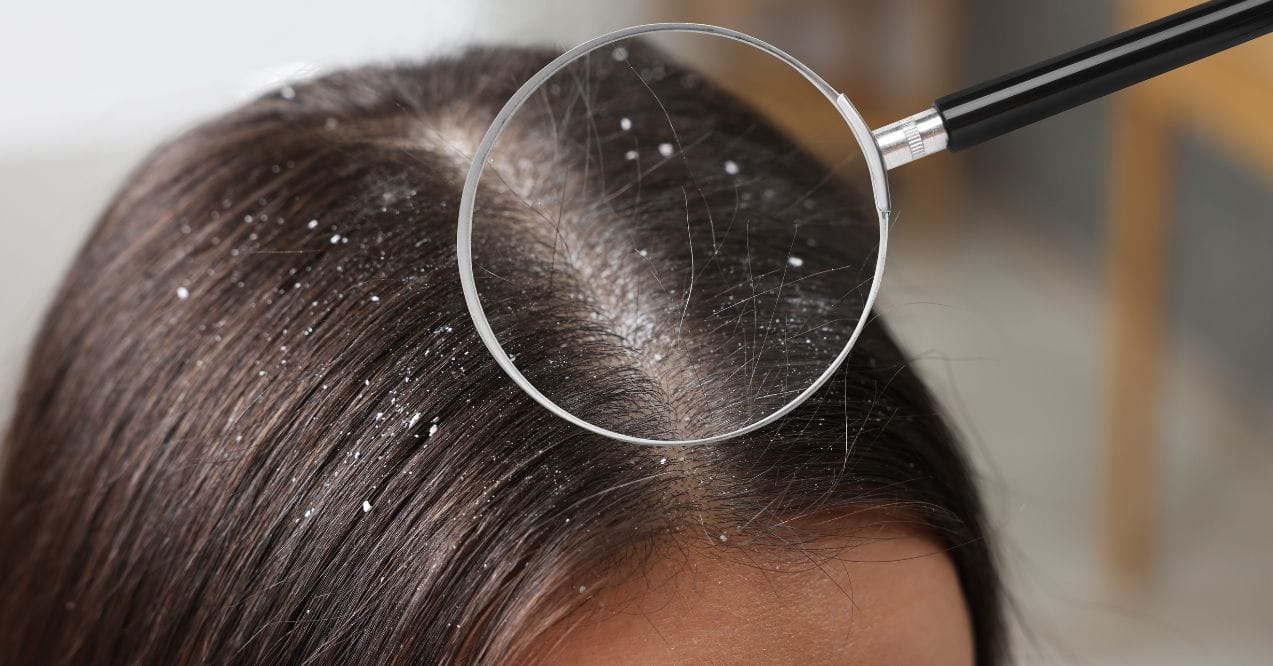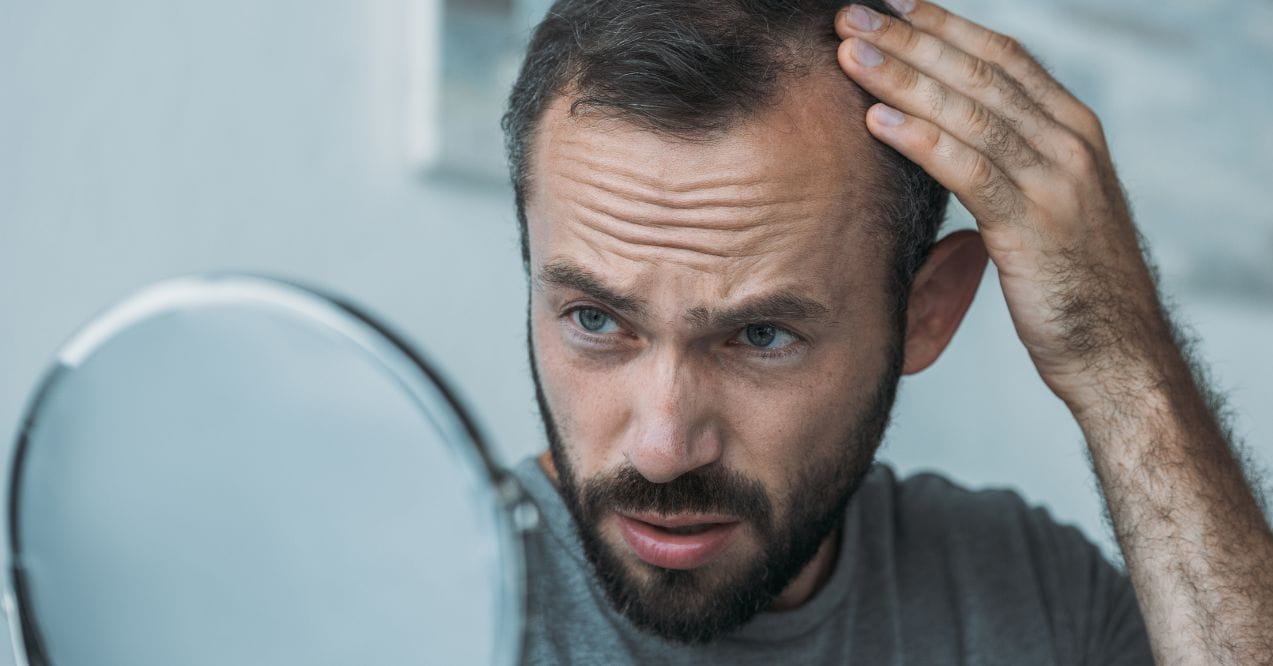Can Dandruff Cause Hair Loss?
Medically reviewed by our experts


Wondering can dandruff cause hair loss? This question troubles many individuals who notice white flakes on their shoulders alongside increased hair shedding in the shower drain. Dandruff, a common scalp condition characterized by flaking skin cells, affects nearly half of adults worldwide. Unlike more serious scalp conditions, dandruff typically presents as small, dry white or grayish flakes without significant inflammation.
While dandruff itself doesn’t directly cause permanent hair thinning, the associated itching, scratching, and inflammation may contribute to temporary shedding. In this blog, we’ll explore the science behind the relationship between scalp flaking and hair health, and discuss evidence-based approaches to maintain a healthy scalp environment for optimal hair growth.
Key Article Findings
- Dandruff doesn’t cause permanent hair loss, only temporary shedding from scratching
- Dandruff-related thinning is evenly distributed and improves when scalp conditions resolve
- Medicated shampoos with targeted ingredients effectively manage dandruff and protect hair
What Is Dandruff and Why It Happens
Dandruff manifests as visible white or grayish flakes that shed from the scalp and often land on shoulders or clothing. Unlike simple dry scalp, true dandruff involves an accelerated turnover of skin cells that clump together and flake off visibly.
Common causes of dandruff include:
- Seborrheic dermatitis (oily, irritated skin)
- Overgrowth of naturally occurring Malassezia yeast
- Increased oil production on the scalp
- Individual skin sensitivity to hair products
- Environmental factors like stress or seasonal changes
- Insufficient washing your hair or improper rinsing
These factors can disrupt your scalp’s natural balance, leading to the characteristic flaking and occasional itchiness.
Can Dandruff Cause Hair Loss?
So, does dandruff lead to hair loss? The relationship between these two conditions is complex but important to understand. Strictly speaking, dandruff itself doesn’t directly cause permanent hair loss. However, the inflammation and irritation associated with severe dandruff can potentially impact hair growth in several ways:
- Excessive scratching due to itchiness can physically damage hair follicles
- Inflammation from seborrheic dermatitis may disrupt the normal hair growth cycle
- Accumulated flakes and oils can block hair follicles, impeding healthy growth
- Continuous scratching may create micro-wounds that compromise scalp health
Research indicates that while dandruff cause hair loss concerns are common, any hair shedding related to dandruff is typically temporary. The scientific consensus suggests that once the underlying scalp condition is addressed, normal hair growth usually resumes. This explains why individuals who successfully manage their dandruff often report improved hair retention.
Additionally, studies examining dandruff and hair loss have found that severe, untreated cases of seborrheic dermatitis correlate with temporary thinning in some individuals. The key understanding is that addressing the scalp condition promptly can prevent this cycle of irritation and temporary shedding from continuing.
Does Scratching Dandruff Cause Hair to Fall Out?
Does dandruff cause hair to fall out if you scratch it? Persistent scratching of an itchy, flaky scalp creates a problematic cycle for hair health. When you repeatedly scratch your scalp, you can:
- Damage the protective outer layer of the skin
- Create micro-abrasions that may become inflamed
- Physically dislodge hairs that were not ready to shed
- Weaken hair shafts at their base
This mechanical stress on hair follicles doesn’t cause permanent loss of hair-growing capability. Rather, it disrupts the normal growth cycle, potentially leading to temporary thinning. Once scratching stops and the scalp environment improves, affected follicles typically resume their normal growth pattern within weeks to months.
When Dandruff and Hair Thinning Occur Together
While dandruff and hair thinning often appear simultaneously, determining the true cause-and-effect relationship can be challenging. The connection between these two conditions frequently confuses many individuals experiencing both scalp flaking and reduced hair density.
So, can dandruff cause hair thinning? Here are key differences to help distinguish the causes:
| Dandruff-Related Hair Thinning | Pattern-Related Thinning |
| Even distribution across scalp | Follows predictable patterns (crown, temples) |
| Temporary, often reversible | Progressive, typically permanent |
| Accompanied by itching/irritation | Usually without scalp discomfort |
| Improves when dandruff resolves | Continues regardless of scalp condition |
Hair thinning that occurs with dandruff typically affects the entire scalp rather than following genetic patterns. Many people wonder, does high testosterone cause baldness? While hormonal factors play a significant role in pattern thinning, they are generally unrelated to dandruff-induced shedding.
Seasonal fluctuations in both conditions may create the appearance of a stronger connection than actually exists. For accurate assessment of your specific situation, seeking professional evaluation is recommended, particularly if hair thinning persists after successfully addressing dandruff.
How to Treat Dandruff and Prevent Hair Loss
Addressing dandruff effectively can help alleviate associated hair shedding. The most successful approach combines specialized products with healthy hair care habits.
Effective Active Ingredients
Look for these science-backed components in dandruff shampoo formulations:
- Selenium sulfide – Reduces fungal presence and slows skin cell turnover
- Zinc pyrithione – Controls yeast growth while soothing inflammation
- Salicylic acid – Helps remove flake buildup and clear follicle openings
- Ketoconazole – Targets fungal overgrowth with powerful antifungal properties
- Tea tree oil – Natural alternative with antimicrobial properties
When using medicated shampoo, allow the product to remain on your scalp for 3-5 minutes before rinsing to maximize effectiveness. Consistent use is crucial – many people see results within 2-3 weeks of regular application.
Supportive Hair Care Practices
- Wash hair regularly to prevent oil buildup (every 1-2 days for oily scalps)
- Avoid excessive heat styling, which can further irritate the scalp
- Minimize heavy styling products that may contribute to residue accumulation
- Stay hydrated and maintain balanced nutrition for optimal scalp health
- Manage stress through regular exercise and relaxation techniques
Supporting your scalp from within matters just as much as topical treatments. Hair Switch provides this internal support with 17 potent and natural vitamins, minerals, and hair-supporting compounds. The formula works to help rebalance and trigger the 3-step process for healthy hair regrowth.
Key ingredients include Vitamin A for maintaining healthy scalp tissue, Biotin to strengthen hair structure at its roots, and Vitamin C to support collagen production. When combined with proper dandruff management, Hair Switch creates an optimal foundation for scalp health and vibrant hair.
Choosing the Right Shampoo
Selecting appropriate hair products for dandruff control requires matching active ingredients to your specific scalp condition:
- For mild flaking – Start with zinc pyrithione or selenium sulfide formulations
- For oily scalps – Choose salicylic acid-based options that help remove excess sebum
- For severe flaking – Consider stronger formulations with ketoconazole
- For sensitive skin – Look for gentler options with tea tree oil or zinc pyrithione
Alternate between two different active ingredients if one stops being effective over time. If over-the-counter options provide insufficient relief after 4 weeks of consistent use, consulting with a dermatology professional can help identify underlying factors and provide personalized recommendations.
Conclusion
So, can dandruff cause hair loss? While dandruff itself doesn’t directly lead to permanent hair loss, the associated inflammation, irritation, and scratching can contribute to temporary shedding. The good news is that addressing dandruff promptly can help maintain a healthy scalp environment that supports optimal hair growth. Consistent use of appropriate medicated shampoos and gentle hair care practices can effectively manage flaking and reduce related hair shedding.
It’s important to note that persistent or severe cases warrant professional evaluation to rule out other scalp conditions. By understanding the connection between scalp health and hair retention, you can take informed steps to protect your hair while effectively managing dandruff.
No, dandruff doesn’t cause permanent hair loss. While the scratching and inflammation associated with dandruff may lead to temporary shedding, it doesn’t destroy hair follicles or permanently impair their ability to produce new hair.
Yes, addressing dandruff can help restore normal hair growth cycles. If your hair shedding was primarily due to scalp inflammation and irritation from dandruff, treating the underlying condition allows follicles to resume healthy function.
Hair thinning related to dandruff is typically reversible. Once you control the scalp inflammation and eliminate excessive scratching, affected hair follicles generally return to their normal growth cycle within a few months.
Look for zinc pyrithione, selenium sulfide, ketoconazole, salicylic acid, or tea tree oil. Choose based on your scalp type – salicylic acid for oily scalps, tea tree for sensitive skin, and ketoconazole for severe cases.
What type of dandruff is causing your flaky scalp? (2021). Healthline.
Seborrheic dermatitis – Symptoms and causes. (n.d.). Mayo Clinic.
Trueb, R., Henry, J., Davis, M., & Schwartz, J. (2018). Scalp condition impacts hair growth and retention via oxidative stress. International Journal of Trichology, 10(6), 262.
Borda, L. J., & Wikramanayake, T. C. (2015). Seborrheic Dermatitis and Dandruff: A Comprehensive review. Journal of Clinical and Investigative Dermatology, 3(2).
Pietrangelo, A. (2024). Scabs and sores on scalp: Potential causes, pictures, and treatment. Healthline.
Cherney, K. (2024). The 12 best Ways to Stop hair Thinning in 2024. Healthline.
Godse, G., & Godse, K. (2024). Safety, Efficacy and Attributes of 2.5% selenium sulfide shampoo in the treatment of dandruff: a Single-Center Study. Cureus.
Reeder, N. L., et al. (2011). Zinc Pyrithione Inhibits Yeast Growth through Copper Influx and Inactivation of Iron-Sulfur Proteins. Antimicrobial Agents and Chemotherapy, 55(12), 5753–5760.
Arif, T. (2015). Salicylic acid as a peeling agent: a comprehensive review. Clinical Cosmetic and Investigational Dermatology, 455.
Carson, C. F., Hammer, K. A., & Riley, T. V. (2006). Melaleuca alternifolia (Tea Tree) Oil: a Review of Antimicrobial and Other Medicinal Properties. Clinical Microbiology Reviews, 19(1), 50–62.
VanBuren, C. A., & Everts, H. B. (2022). Vitamin A in Skin and hair: An update. Nutrients, 14(14), 2952.
Patel, D. P., Swink, S. M., & Castelo-Soccio, L. (2017). A review of the use of biotin for hair loss. Skin Appendage Disorders, 3(3), 166–169.
Boyera, N., Galey, I., & Bernard, B. (1998). Effect of vitamin C and its derivatives on collagen synthesis and cross‐linking by normal human fibroblasts. International Journal of Cosmetic Science, 20(3), 151–158.
Popular Articles
Advertisement. This site offers health, wellness, fitness and nutritional information and is designed for educational purposes only. You should not rely on this information as a substitute for, nor does it replace, professional medical advice, diagnosis, or treatment. If you have any concerns or questions about your health, you should always consult with a physician or other health-care professional. Do not disregard, avoid or delay obtaining medical or health related advice from your health-care professional because of something you may have read on this site. The use of any information provided on this site is solely at your own risk.







